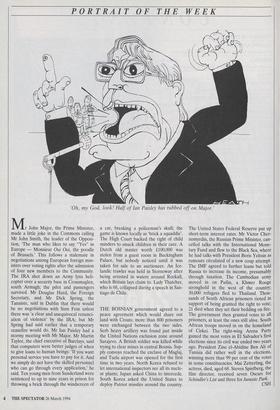PORTRAIT OF THE WEEK
'Oh, my God, look! Half of Ian Paisley has rubbed off on Major.'
Mr John Major, the Prime Minister, made a little joke in the Commons calling Mr John Smith, the leader of the Opposi- tion, 'The man who likes to say "Yes" in Europe — Monsieur Out Oui, the poodle of Brussels.' This follows a stalemate in negotiations among European foreign min- isters over voting rights after the admission of four new members to the Community. The IRA shot down an Army lynx heli- copter over a security base in Crossmaglen, south Armagh; the pilot and passengers survived. Mr Douglas Hurd, the Foreign Secretary, and Mr Dick Spring, the Tanaiste, said in Dublin that there would be no negotiations with Sinn Fein unless there was 'a clear and unequivocal renunci- ation of violence' by the IRA; but Mr Spring had said earlier that a temporary ceasefire would do. Mr Ian Paisley had a stormy meeting with Mr Major. Mr Martin Taylor, the chief executive of Barclays, said that computers were better judges of when to give loans to human beings: 'If you want personal service you have to pay for it. And we simply do not have the skilled personnel who can go through every application,' he said. Ten young men from Sunderland were sentenced to up to nine years in prison for throwing a brick through the windscreen of a car, breaking a policeman's skull; the game is known locally as 'brick a squaddie'. The High Court backed the right of child minders to smack children in their care. A Dutch old master worth £100,000 was stolen from a guest room in Buckingham Palace, but nobody noticed until it was taken for sale to an auctioneer. An Ice- landic trawler was held in Stornoway after being arrested in waters around Rockall, which Britain lays claim to. Lady Thatcher, who is 68, collapsed during a speech in San- tiago de Chile.
THE BOSNIAN government agreed to a peace agreement which would share out land with Croats; more than 800 prisoners were exchanged between the two sides. Serb heavy artillery was found just inside the United Nations exclusion zone around Sarajevo. A British soldier was killed while trying to clear mines in central Bosnia. Sup- ply convoys reached the enclave of Maglaj, and Tuzla airport was opened for the first time in two years. North Korea refused to let international inspectors see all its nucle- ar plants; Japan asked China to intercede. South Korea asked the United States to deploy Patriot missiles around the country. The United States Federal Reserve put up short-term interest rates. Mr Victor Cher- nomyrdin, the Russian Prime Minister, can- celled talks with the International Mone- tary Fund and flew to the Black Sea, where he had talks with President Boris Yeltsin as rumours circulated of a new coup attempt. The IMF agreed to further loans but told Russia to increase its income, presumably through taxation. The Cambodian army moved in on Pailin, a. Khmer Rouge stronghold in the west of the country; 30,000 refugees fled to Thailand. Thou- sands of South African prisoners rioted in support of being granted the right to vote; 21 died when they set their bedding on fire. The government then granted votes to all prisoners, at least the ones still alive. South African troops moved in on the homeland of Ciskei. The right-wing Arena Party gained the most votes in El Salvador's first elections since its civil war ended two years ago. President Zine el-Abidine Ben All of Tunisia did rather well in the elections, winning more than 99 per cent of the votes in some constituencies. Mai Zetterling, the actress, died, aged 68. Steven Spielberg, the film director, received seven Oscars for Schindler's List and three for Jurassic Park.
CSH


























































 Previous page
Previous page